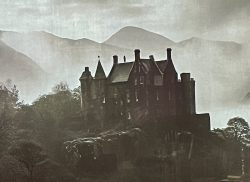 SOME years ago we visited a remote castle in Scotland, as a possible choice for a big family holiday. Within minutes of entering the ancient stone tower we were chilled and alarmed, wrapped in a an insidious sense of misery that only grew worse as we went through more rooms.
SOME years ago we visited a remote castle in Scotland, as a possible choice for a big family holiday. Within minutes of entering the ancient stone tower we were chilled and alarmed, wrapped in a an insidious sense of misery that only grew worse as we went through more rooms.
Later, we learned that for many years, in a long and often bloody history, it had been used as a female asylum – a cold and brutal prison for young and old women whose “crimes” were nothing more than an unwillingness to marry their father’s choice, an ill-advised liaison, an out-of-wedlock child, menopause turmoil … or simply an independent spirit.
Neither of us is given to hysterical reaction or supernatural foreboding. This castle was terrifying. We didn’t book the holiday.
Hill House, in a remote location in the north of England, is a house of nightmares, surrounded by stories of ghosts, long empty, apart from a brusque and unfriendly housekeeper-cook (who lives elsewhere), played at the Swan by Ann Cook.
Into this unwelcoming setting come two women, the slightly older, Theodora (Lesley Baker-Evans), a psychic, and Eleanor (Alice Browne), who experienced a deeply disturbing poltergeist onslaught as a child. They are the guests of paranormal scientist Dr Montague (Ben Woof), who arrives shortly afterwards with Luke (Peter Carter-Brown), who has inherited Hill House from an aunt.
Theodora is flighty and witty, glamorous and more curious than frightened. Eleanor is nervous, still coming to terms with the recent death of the mother she nursed for many years. Dr Montague (how good to see Ben Woof back on the Swan stage) is properly pragmatic about his project, while Luke seems a jokey, flirty light-weight …
Later in the quartet’s stay, Mrs Montague (Rachel Butcher) arrives, with her friend and driver, headmaster Arthur (Shaun Driver). These two provide the light relief for a very dark story. Mrs Montague is a Madam Arcati-type medium, complete with planchette to “write” the sayings of the “poor dear lost souls” – walled-up nuns and the like – with whom she makes “contact”. Arthur is the epitome of the sports-mad headmaster who calls nervous boys “milk-sops” and stomps around with a loaded pistol to show how fearless he is. These two are very funny.
And we need the laughs because F Andrew Leslie’s stage adaptation of Shirley Jackson’s 1930s-set novel (published in 1959) is a a play full of shocks and terror, unsettling questions and unresolved trauma.
At its heart, like Susan Hill’s much better-known gothic thriller, The Woman in Black, this is a story of loss, grief, guilt and the legacy of past (mis)deeds.
Debut director Dave King, an experienced actor, wanted his first play to be from the horror and ghost genre. He had known The Haunting of Hill House as a book for some time – it has been filmed twice and was the basis of a successful Netflix mini-series. He and the Swan team eventually found the play and obtained a licence to perform it, moving the action from its original setting in the north-eastern US to northern England.
This is a play which makes considerable demands on the company’s technical crew and, as always, the Swan company rises to the challenge. Renowned for the quality of their sets, the stage management, lighting and sound people provide enough scary pounding fists, thunderous roars, creepy red back-light and unaided opening and closing doors to satisfy the most demanding gothic horror fans.
While Dr Montague is the reason the mismatched guests are gathered at Hill House, it is the mouse-like Eleanor around whom the action storms and swirls and Alice Browne rises impressively to the demands of the role. We see her grow, not so much in courage as resolve, as she faces the demons that are circling, unseen but insistent, in this unhappy house.
The Haunting of Hill House, a very good choice for cold dank November nights, runs to Saturday 23rd November.
FAC
Pictured is the atmospheric image that fades to lead the audience into the haunted mansion.